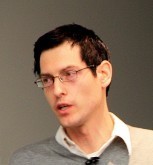The 33-year-old vegan activist says he was strongly influenced by the straightedge hardcore music scene of the early 90s. He's currently a spokesperson for the controversial Animal Liberation Front, a loosely-affiliated network of animal-rights activists known for breaking laws in order to combat the cruelty inherent in factory farming, the fur industry and scientific experimentation.
Tomorrow night at 6 p.m., Young is coming to St. Louis University's Carlo Auditorium to present Bold Native, a movie that he says will put a human face to the ALF and help demystify what it does. The Daily RFT caught up with Young just after his plane touched down in the Lou.
RFT: What can we expect from Bold Native?
PY: It's not a documentary, it's a very good story. Bold Native is actually kind of a landmark film. It's the first fictionalized take on the Animal Liberation Front. It's going to demystify the Animal Liberation Front. You get a glimpse of what happens to animals, but it's not done in a way that you feel like you're being preached to. The [slaughterhouse] footage is real, but it kind of flies in under the radar. It's a story about a father who loves his son and wants to see his son not spend the rest of his life in prison, wants to see his son again and is caught in a moral struggle between his role as a CEO of a fast food company and his [animal-rights activist] son.
RFT: And you're in it, right? How was that?
PY: It was really fun. It was my acting debut. I play the role of somebody who's there when there's a massive coordinated ALF action in the works. I play somebody who is not quite happy with how this action is being carried out and feels like it should be carried out differently.
RFT: Is that something that happens a lot?
PY: Sure, I think one of the things you might see among the ALF is how somebody would stand up to pressure if they're being interrogated by the FBI. Also, how solid are the people who are taking these animals? You can get in and out of a laboratory in a couple of hours but the people who have the animals, in addition to caring for them, they are holding evidence indefinitely. They need to be just as solid, if not more so.
RFT: What should people know about the ALF? Are they terrorists?
PY: When I broke the law for animals, it wasn't something I relished. It was something I felt like I had to do. These are people that care very much and regrettably feel like they have to break the law. Despite the fact that I have taken what some would call an extreme route to this idea, being vegan is the best thing you can do for animals. I do think that the problem is so bad right now that it does justify an elevated level of action.
RFT: You've mentioned hardcore straightedge music as a big influence on your life. What are other ways people can learn about factory farming and animal abuse?
PY: The single most powerful thing you can do would be to visit a local slaughterhouse, visit a local egg farm.The internet obviously houses a wealth of information. Watch videos, watch [PETA's seminal slaughterhouse footage film] Meet Your Meat. Several of the cast members [of Bold Native] were not vegan before participating but over the course of filming decided it was the only option.
RFT: What about people who watch movies like that or are presented with information about factory farming and don't give their habits a second thought?
PY: That's something that's been called moral schizophrenia -- people have a way of compartmentalizing their morals. They say 'If anyone hurt my dog, I'd hurt them' but they'll sit down and eat chicken at every meal. I was that person too but once someone pointed it out to me at 16, there was no going back.
RFT: How did prison change you?
PY:
It made me realize I can handle the worst possible thing life can hand
me. It made me realize just how limp most of the threats of the
government really are. As an activist, it made me realize just how silly
a lot of our fears are -- activists are afraid to show up at a rally.
I've got others that won't even call me -- they're afraid they be put on
a list. A lot of what we're afraid of is really quite silly when you
see it up close. I can say I've seen it from the inside and what's
happening to animals is much worse. It's such a privileged position to
get up and say 'Ugh, I have to make a sign or send out this literature.'
You can only say that from a very privileged human position of not
being stuck inside a veal crate.


